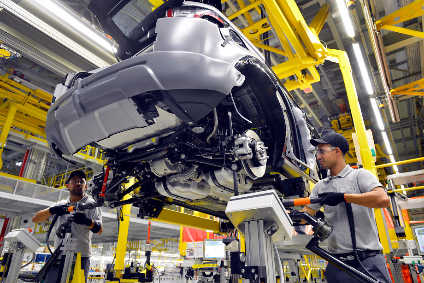
UK car manufacturing fell in April, according to figures released by the SMMT. Some 122,116 cars were produced in the month, an -18.2% decrease on April 2016. The SMMT said that the timing of Easter adversely impacted the April total this year.
Despite the decline, year-to-date production remains at a high level, in historical terms, with 593,796 cars made so far in 2017 – a 1.0% increase on the same period last year – reaching its highest level for the first four months of the year since 2000.

Discover B2B Marketing That Performs
Combine business intelligence and editorial excellence to reach engaged professionals across 36 leading media platforms.
Demand from overseas buyers continues to drive growth, up 3.5% so far this year and offsetting a fall at home of -7.0%. In total 76.8% of all cars made in the UK since January have been shipped abroad, with the majority going into the EU.
The news comes as SMMT publishes its priorities for the next government following the general election in June. UK Automotive Priorities, Securing the Strength of the UK Automotive Industry 2017 – 2022 sets out what is required to ensure the ongoing success of a crucial sector that supports 814,000 jobs nationwide, one that has a turnover of £71.6 billion every year.
Mike Hawes, SMMT Chief Executive, said, “Car production fell significantly in April due to the later Easter bank holiday weekend which reduced the number of active production days that month and also due to unplanned production adjustments. Overall, British car manufacturing remains in good health with the production outlook still very positive and significant new models due to go into UK production shortly. To guarantee future growth and investment into our industry and its vital supply chain, however, we need the next government to safeguard the conditions that have made us globally competitive, keeping us open and trading and delivering an ambitious industrial strategy for our sector.”
UK Automotive Priorities 2017- 2022, according to SMMT:
- A globally competitive business environment to support investment, growth and job creation.
- A new trading relationship with the EU which safeguards the interests of UK Automotive.
- An ambitious industrial strategy delivering for automotive as a strategic sector.
- A holistic strategy to support sustainable mobility and ULEV uptake.
- Effective policies to ensure the UK secures the benefits of digitalisation
Looking ahead, Stuart Apperley, Director and Head of UK Automotive at Lloyds Bank Commercial Banking, said that export prospects in key markets are deteriorating. “After a strong first quarter, April’s dip in European car sales was a little sharper than expected.
“Given the impact of UK tax changes and fewer trading days around Easter, we might see demand rebound in May. But if it is a sign that sales are beginning to plateau on the Continent, we could see this filtering through to production figures here, with UK production being so heavily reliant on European demand.
“The news isn’t necessarily better in other important markets for our UK manufacturers, with both the US and China seeing new vehicle sales decline in April too.
“Domestically there are also pressures on consumer demand. With inflation squeezing incomes in the UK, the affordability of a new car becomes a bigger consideration.
“Reassuringly, if we do start to see a downward trend in the months to come, the industry is better prepared for any decline than in previous years, with vehicles produced to order and stock levels tightly managed.”






